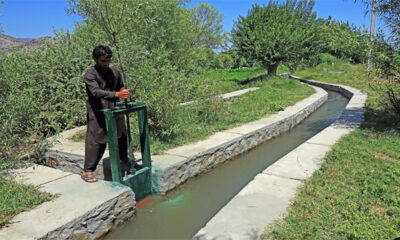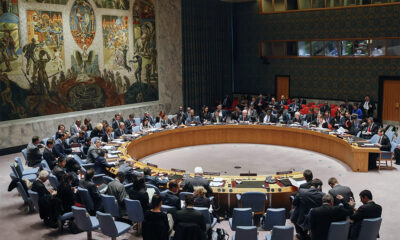World
More than 500 people dead and thousands injured in major Turkey, Syria earthquake
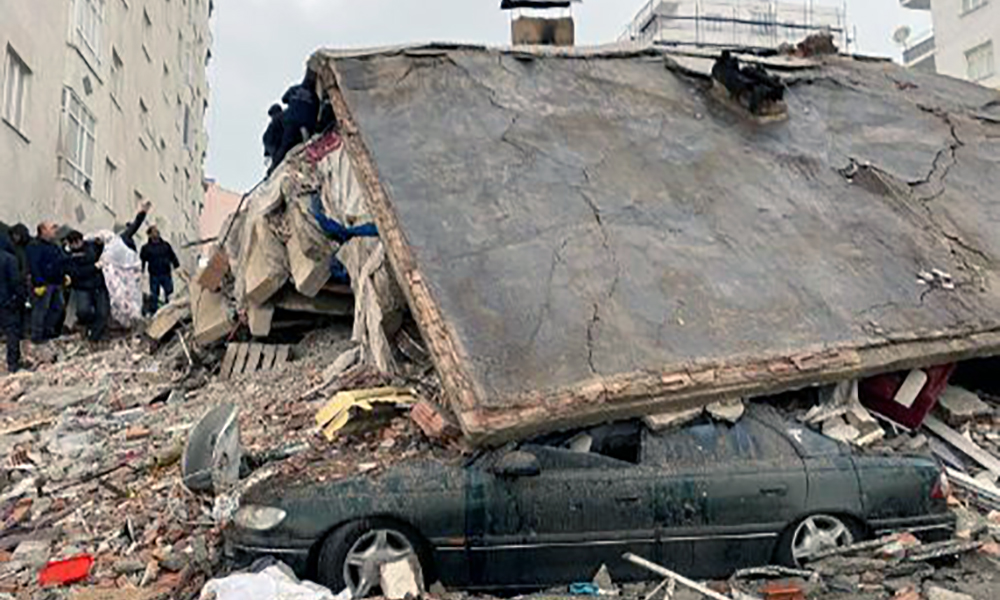
More than 500 people were killed and thousands injured on Monday, after a major earthquake of magnitude 7.8 struck central Turkey and northwest Syria, collapsing buildings and triggering searches for survivors in the rubble.
The quake, which hit in the early hours of Monday morning was also felt in Cyprus and Lebanon.
“We were shaken like a cradle. There were nine of us at home. Two sons of mine are still in the rubble, I’m waiting for them,” said a woman with a broken arm and wounds on her face, speaking in an ambulance near the wreckage of a seven-storey block where she had lived in Diyarbakir in southeast Turkey.
“I have never felt anything like it in the 40 years I’ve lived,” said Erdem, a resident of the Turkish city of Gaziantep, near the quake’s epicentre, who declined to give his surname.
“We were shaken at least three times very strongly.”
Turkish Vice President Fuat Oktay said 284 people were killed and 2,323 injured, as authorities scrambled rescue teams and supply aircraft for the affected area, while declaring a “level 4 alarm” that calls for international assistance.
In Syria, already devastated by more than 11 years of civil war, a government health official said more than 237 people had been killed and about 600 injured, most in the provinces of Hama, Aleppo and Latakia, where numerous buildings tumbled down.
In the Syrian rebel-held northwest, a rescue service said dozens had been killed.
Turkish broadcaster RTR showed rescue workers in Osmaniye province using a blanket to carry an injured man out of a collapsed four-storey building and putting him in an ambulance. He was the fifth to be pulled from the rubble, it said.
Footage on broadcaster CNNTurk showed the historic Gaziantep Castle was severely damaged.
President Tayyip Erdogan spoke by telephone with the governors of eight affected provinces to gather information on the situation and rescue efforts, his office said in a statement.
“There was a huge noise and the building next to ours collapsed when the earthquake happened,” said a 30-year-old in Diyarbakir.
“I rushed outside. There was screaming everywhere. I started pulling rocks away with my hands. We pulled out the injured with friends, but the screaming didn’t stop. Then the (rescue) teams came.”
‘TOTALLY DESTROYED’
In the Syrian city of Aleppo, heavily damaged during the war, health director Ziad Hage Taha told Reuters wounded people were “arriving in waves”.
Syrian state television showed footage of rescue teams searching for survivors in heavy rain and sleet.
Rescue workers in rebel-held areas of Syria reported extensive damage.
In the border town of Azaz – an area held by opposition forces – a rescue worker carried a toddler from a damaged building. Another group carried a body wrapped in a white sheet as a crane pulled away concrete slabs, a Reuters witness said.
“Tens of buildings have collapsed in the city of Salqin,” a member of the White Helmets rescue organisation said in a video clip on Twitter, referring to another town about 5 km (3 miles) from the Turkish border.
President Bashar al-Assad was holding an emergency cabinet meeting to review the damage and discuss the next steps, his office said.
People in Damascus, and in the Lebanese cities of Beirut and Tripoli, ran into the street and took to their cars to get away from their buildings in case they collapsed, witnesses said.
U.S. OFFER OF HELP
The United States was “profoundly concerned” about the quake in Turkey and Syria and was monitoring events closely, White House national security adviser Jake Sullivan said on Twitter.
“I have been in touch with Turkish officials to relay that we stand ready to provide any and all needed assistance,” he said.
The U.S. Geological Survey said the magnitude 7.8 quake struck at a depth of 17.9 km. It reported a series of earthquakes, one of 6.7 magnitude.
The region straddles seismic fault lines.
It was Turkey’s most severe quake since 1999, when one of similar magnitude devastated Izmit and the heavily populated eastern Marmara Sea region near Istanbul, killing more than 17,000.
Monday’s tremor lasted about a minute and shattered windows, according to a Reuters witness in Diyarbakir, 350 km (218 miles)to the east, where a security official said at least 17 buildings collapsed.
Authorities said 16 structures collapsed in Sanliurfa and 34 in Osmaniye.
Broadcasters TRT and Haberturk showed footage of people picking through building wreckage, moving stretchers and seeking survivors in the city of Kahramanmaras, where it was still dark.
“Our primary job is to carry out the search and rescue work and to do that all our teams are on alert,” Turkish Interior Minister Suleyman Soylu told reporters.
Tremors were also felt in the Turkish capital of Ankara, 460 km (286 miles) northwest of the epicentre, and in Cyprus, where police reported no damage.
“The earthquake struck in a region that we feared. There is serious widespread damage,” Kerem Kinik, the chief of the Turkish Red Crescent relief agency, told Haberturk, issuing an appeal for blood donations.
World
UN Security Council to vote Friday on Palestinian UN membership
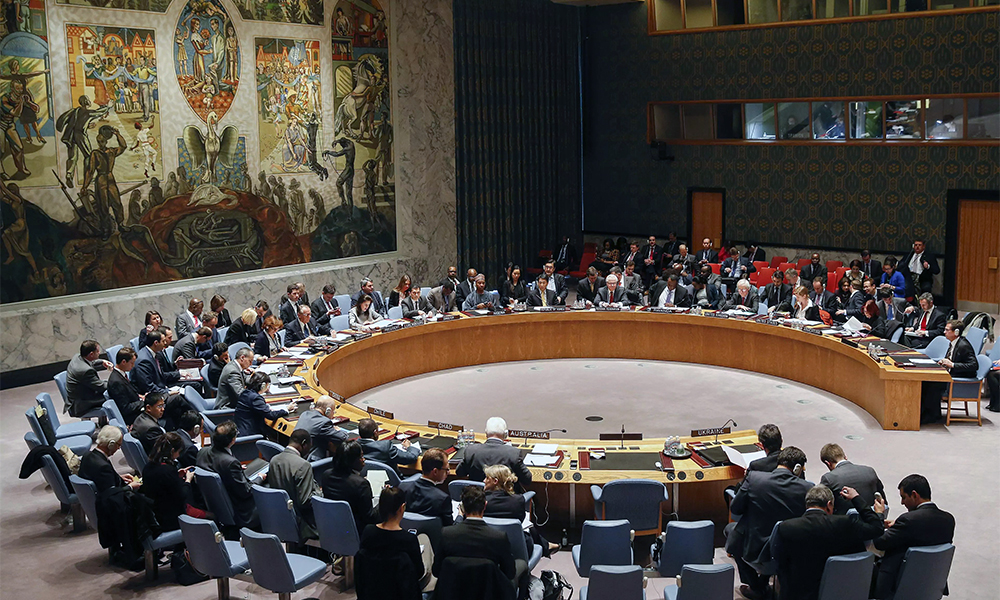
The United Nations Security Council is scheduled to vote Friday on a Palestinian request for full U.N. membership, said diplomats, a move that Israel ally the United States is expected to block because it would effectively recognize a Palestinian state.
The 15-member council is due to vote at 3 pm Friday on a draft resolution that recommends to the 193-member U.N. General Assembly that “the State of Palestine be admitted to membership of the United Nations,” diplomats told Reuters.
A council resolution needs at least nine votes in favor and no vetoes by the U.S., Britain, France, Russia or China to pass. Diplomats say the measure could have the support of up to 13 council members, which would force the U.S. to use its veto.
Council member Algeria, which put forward the draft resolution, had requested a vote for Thursday afternoon to coincide with a Security Council meeting on the Middle East, which is due to be attended by several ministers.
The United States has said that establishing an independent Palestinian state should happen through direct negotiations between the parties and not at the United Nations.
“We do not see that doing a resolution in the Security Council will necessarily get us to a place where we can find … a two-state solution moving forward,” U.S. Ambassador to the U.N. Linda Thomas-Greenfield said on Wednesday.
The Palestinians are currently a non-member observer state, a de facto recognition of statehood that was granted by the 193-member U.N. General Assembly in 2012. But an application to become a full U.N. member needs to be approved by the Security Council and then at least two-thirds of the General Assembly.
The U.N. Security Council has long endorsed a vision of two states living side by side within secure and recognized borders. Palestinians want a state in the West Bank, east Jerusalem and Gaza Strip, all territory captured by Israel in 1967.
Little progress has been made on achieving Palestinian statehood since the signing of the Oslo Accords between Israel and the Palestinian Authority in the early 1990s.
World
EU leaders back new Iran sanctions after attack on Israel

European Union leaders decided on Wednesday to step up sanctions against Iran after Tehran’s missile and drone attack on Israel left world powers scrambling to prevent a wider conflict in the Middle East, Reuters reported.
The summit in Brussels is the first meeting of the EU’s 27 national leaders since Saturday’s attack, more than six months into the war between Israel and the Iran-backed Palestinian militant group Hamas.
Israel has signalled it will retaliate but has not said how. EU leaders condemned the Iranian attack, reaffirmed their commitment to Israel’s security and called on all sides to prevent more tensions, including in Lebanon.
“We feel it’s very important to do everything to isolate Iran,” said summit chairman Charles Michel, adding the new sanctions against the Islamic Republic would target companies involved in the production of drones and missiles.
German Chancellor Olaf Scholz said it was important that Israel “does not respond with a massive attack of its own.”
Italy spoke separately ahead of G7 talks in favour of sanctions against arms suppliers linked to the attack against Israel, as well as those behind attacks on ships in the Red Sea, read the report.
Iran launched its assault in response to an April 1 strike on its embassy in Damascus which it blamed on Israel. Tel Aviv started its broader military offensive in Gaza after Hamas’ deadly attack on Israel on Oct. 7.
ISRAEL AND UKRAINE
EU foreign ministers are due to continue the sanctions work on Monday as the United States and its Western allies hope new steps against Iran will help limit any Israeli retaliation.
The EU already has multiple programmes that target Iran for human rights abuses, the proliferation of weapons of mass destruction, and Tehran’s support for Russia’s war in Ukraine, Reuters reported.
Germany, France and several EU states are looking at expanding a scheme that seeks to curb the supply of Iranian drones to Russia to include the provision of missiles and cover deliveries to Iranian proxies in the Middle East.
Belgium backed introducing sanctions against Iran’s Revolutionary Guard Corps but Scholz said that required further legal checks. The bloc’s top diplomat has said that could only happen if a national authority in the EU found that the group had been involved in terrorist activity.
Analysts say Iran is unlikely to face more severe economic punishment because of worries about boosting oil prices and angering top buyer China.
With the Middle East capturing much of the EU’s attention, Ukraine’s President Volodymyr Zelenskiy appealed for more help in holding the line against Russia, which unleashed an invasion against its neighbour more than two years ago, read the report.
“Here in Ukraine, in our part of Europe, unfortunately, we do not have the level of defence that we all saw in the Middle East a few days ago,” Zelenskiy told the summit, after Israel and allies mostly shot down the incoming drones and missiles.
“It reflects our current key need – the need for air defence,” he said, according to an EU official, repeating his calls for speedier deliveries of the weapons and ammunition previously promised to Ukraine.
World
US and allies plan more Iran sanctions; Israel war cabinet to meet again
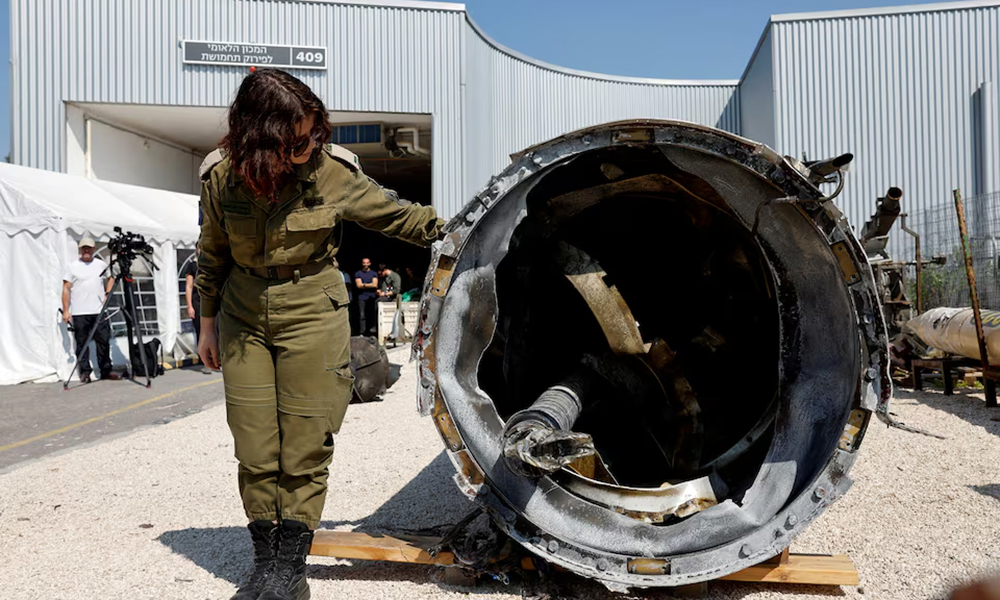
The U.S. and its allies planned fresh sanctions against Iran over its unprecedented attack on Israel, seeking to dissuade Israel from a major escalation as its war cabinet was set to meet for a third time on Wednesday to decide a response, Reuters reported.
While Saturday night’s attack caused no deaths and little damage thanks to the air defences and countermeasures of Israel and its allies, it has increased fears that violence rooted in the six-month-old Gaza war is spreading, with the risk of open war between long-time adversaries Iran and Israel.
Israel’s military chief of staff Herzi Halevi had promised Iran’s launch of more than 300 missiles, cruise missiles and drones at Israeli territory “will be met with a response”, but gave no details.
An Israeli government source said the war cabinet session scheduled for Tuesday had been put off until Wednesday, without elaborating, read the report.
Hoping to steer Israel away from massive retaliation, the U.S. and Europe flagged a toughening of economic and political sanctions against Iran.
The U.S. is planning to impose new sanctions targeting Iran’s missile and drone programme in the coming days and expects its allies will be following suit, National Security Advisor Jake Sullivan said in a statement on Tuesday.
Earlier, Treasury Secretary Janet Yellen said the U.S. would use sanctions, and work with allies, to keep disrupting Iran’s “malign and destabilising activity”.
She told a news conference in Washington all options to disrupt Iran’s “terrorist financing” were on the table, and she expected further sanctions against Iran to be announced soon.
European Union foreign policy chief Josep Borrell, speaking in Brussels after an emergency video conference of EU foreign ministers, said some member states had asked for sanctions against Iran to be expanded and that the bloc’s diplomatic service would begin working on the proposal.
Borrell said the proposal would expand a sanctions regime that seeks to curb the supply of Iranian drones to Russia so that it would also include the provision of missiles and could also cover deliveries to Iranian proxies in the Middle East.
Israeli Foreign Minister Israel Katz said he was “leading a diplomatic attack”, writing to 32 countries to ask them to place sanctions on Iran’s missile programme and follow Washington in proscribing its dominant military force, the Revolutionary Guard Corps, as a terrorist group, Reuters reported.
‘CALM HEADS’
Iran launched the attack in retaliation for an airstrike on its embassy compound in Damascus on April 1 attributed to Israel, but has signalled that it now deems the matter closed.
President Joe Biden told Israeli Prime Minister Benjamin Netanyahu at the weekend that the United States, Israel’s main protector, would not participate in an Israeli counter-strike.
British Prime Minister Rishi Sunak told Netanyahu in a call on Tuesday that escalation in the Middle East was in nobody’s interest and would only worsen insecurity in the region, so it was “a moment for calm heads to prevail”, Sunak’s office said.
Japan Foreign Minister Yoko Kamikawa “strongly urged Israel to exercise restraint” during a call with her Israeli counterpart Israel Kantz on Tuesday evening, according to a readout of the call issued by Japan’s foreign ministry.
The prospect of Israeli retaliation has alarmed many Iranians already enduring economic pain and tighter social and political controls since major protests in 2022-23, read the report.
Since the war in Gaza began in October, clashes have erupted between Israel and Iran-aligned groups based in Lebanon, Syria, Yemen and Iraq.
Israel said four of its soldiers were wounded hundreds of metres inside Lebanese territory overnight, the first known Israeli ground penetration into Lebanon since the Gaza war erupted, although it has regularly traded fire with the heavily armed Lebanese Hezbollah militia.
In Gaza itself, where more than 33,000 Palestinians have been killed in the Israeli offensive according to Gaza health ministry figures, Iran’s action drew applause.
Israel began its campaign against Hamas, the Iranian-backed Palestinian militant group that runs Gaza, after the militants attacked Israel on Oct. 7, killing 1,200 people and taking 253 hostages, by Israeli tallies.
-

 Sport4 days ago
Sport4 days agoACL draw to be broadcast live on ATN channels
-

 Regional4 days ago
Regional4 days agoIRGC chief warns of harsher response if Israel attacks Iran
-
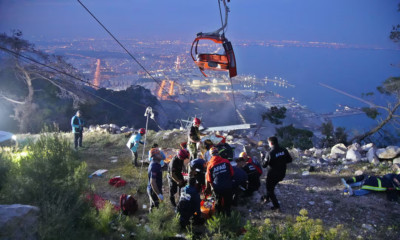
 World5 days ago
World5 days agoOne killed, 10 injured in cable car accident in southern Turkey
-
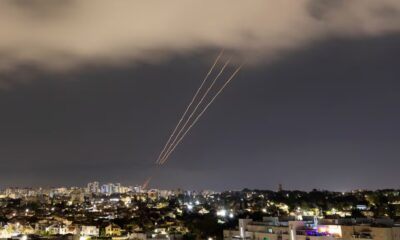
 Regional4 days ago
Regional4 days agoIran launches retaliatory attack on Israel with hundreds of drones, missiles
-

 Sport3 days ago
Sport3 days agoACL fever grows as fixtures finalized
-
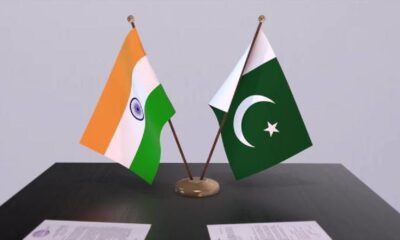
 Latest News4 days ago
Latest News4 days agoContact group on Afghanistan hits roadblock over Pakistan’s gripe with India
-

 Sport4 days ago
Sport4 days agoHetmyer powers Rajasthan win in low-scoring IPL thriller
-
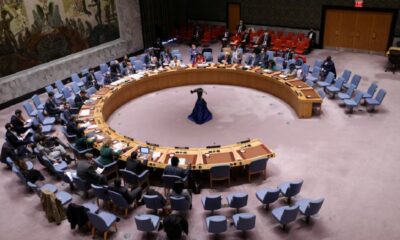
 World4 days ago
World4 days agoUN Security Council to meet Sunday on Iran attack








